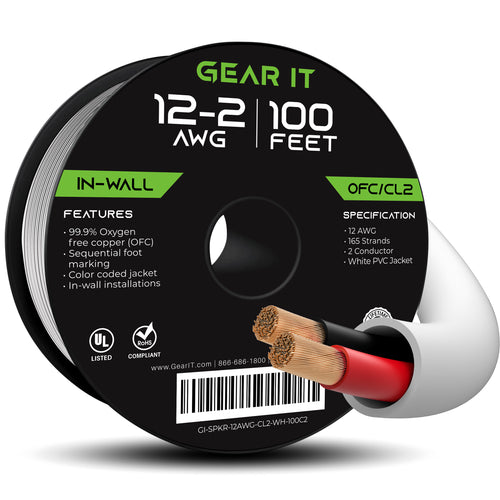Setting up a great home entertainment area can make your house even more enjoyable than it already is. Imagine weekends watching a movie or listening to music in your entertainment space. To make the most of your space, you need powerful speakers that amplify sound perfectly in every situation. As you look for your perfect speakers, don't forget to get the right speaker wires.
Choosing the Right Speaker Wires
In many cases, new high-end speakers don't come with the wires you need to connect them to the audio source. Some may offer wireless connections, but this can be a hassle and doesn't always lead to the best and most reliable experience. Using the proper wires will get you much better results.
What goes into choosing wires for your audio setup? You need to take a close look at your situation and plans to make sure you get the right products.
Wire Gauge
One of the most important choices to make when looking for speaker wires is what gauge to get. Gauge refers to the thickness of the wire. In the United States, it is measured in American Wire Gauge units. On this scale, a lower number represents a thicker wire. For instance, an 8 AWG wire is thicker than a 12 AWG wire.
The thickness of your wire matters because it impacts how electric current passes through the cable. Thicker wires have less resistance, and less resistance means more of the current travels farther. By lowering resistance, you can get increased audio performance.
Typically, wires intended for speakers are somewhere between 10 AWG and 16 AWG. Any of these options may work just fine for your speakers. It becomes more important to get thicker wires when you have long runs of cable. You'll want to have the least amount of resistance and energy loss to get the best sound.
Wire Length
Speaking of long runs of speaker wires, the length you need should directly inform what you purchase. Cables are sold in different lengths, sometimes up to 100 feet or more. Make sure you get a product that is long enough to connect your speakers and amplifiers without needing an extra connection. If you have to splice and bond the wires in the middle, you create a weakness in the wires where sound fidelity can be lost.
Installation Location
It's also important to think about where and how you need to install the wires for your speakers. You probably don't want a pile of wires sitting behind your entertainment center. Installing the cables in the wall looks better, but it takes some work and the right materials.
Wires that will go behind walls need a certain fire resistance rating. You have to make sure your home stays safe and that a power surge in the wire won't turn into a fire. Look for CL2 or CL3 ratings on speaker wires you plan to install behind drywall. Both are designed not to ignite from surges of electricity, although CL3 wire has a higher resistance.
For installations that involve burying the wires, you need to look for another specific designation. The wires you choose should have the words "Direct Burial Outdoor" or something similar on the label. These will also be CL2 or CL3 speaker wires, but they come with special shielding around the wire.
In addition to being fire resistant, these wires are also moisture resistant. Even in dry climates, there is likely some amount of moisture in the ground, and that could be bad for your wires. These cables are also built to stand up to pressure. It may not seem like it, but piles of dirt weigh a lot and can start to crush cables that aren't designed to be exposed to that much force.
Your Speaker's Manual
When you start searching for wires for new speakers, one of the first places to look for information is the manual that came with your speakers. It will have important facts about the equipment and may even recommend a certain type or size of wire.
Something to pay attention to is speaker impedance. This is a measure of how easily electricity flows through the speaker to create sound. The lower the impedance, the more current flows through the device. To keep that electrical current moving to the best of the speaker's capabilities, look for speaker wires that will offer lower resistance and allow more of the audio signal to reach the output.
Core Material
Shopping for wires for your speakers will turn up many different materials for the core of the wire. The most common is copper, but even that has several variations. At GearIT, many of our products are made with oxygen-free copper (OFC). This material resists oxidation so it is less likely to break down as quickly as other wire options.
You can also find plain copper and copper-clad aluminum (CCA) wires. These work well enough in many situations but may not offer the longevity and low resistance of oxygen-free copper.
Some speaker cables are made with silver cores. This precious metal is a great conductor and offers low resistance and current loss. However, it is expensive, and while some speaker enthusiasts claim it creates a better sound, it's usually not noticeable enough to justify the cost.
To choose the right speaker wires, checkout our blog on CCA vs. OFC wires take a moment and look at all of these factors. Do a few measurements to see how far your wires need to run and double-check the stats on your speaker. Then you can shop for the right wires for your setup and budget.


























































